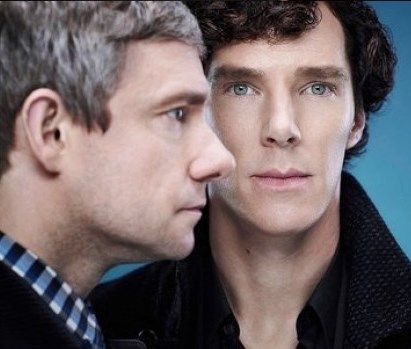
BBC Sherlock Fan Forum - Serving Sherlockians since February 2012.
- Myraya
- John's Army
 Offline
Offline 
- From: Berlin
- Registered: February 18, 2013
- Posts: 368
Why mustn't John know about everything?
Alright this is what I jaust don't understand, please tell me when you've got any idea:
Why is Sherlock so eager to make John believe that he is a fraud? Let me list some points when Sherlock acts quite strange towards John:
1. He gets a taxi for his own
2. He lies to him when John asks wheather Moriarty touched anythin oder wrote anything down. Moryarty touched a cup of tea and he wrote down "IOU" on the apple.
3. He fakes a phone call that makes John believe Mrs. Hudson is injured in order to get rid of him.
4. He doesn't defent himself when Moriarty sais that he hired him, even though John asks him to explain.
5. He claims that he is a fraud during the last phone call.
6. One month after his fake death John still doesn't know about it! (When he is at the therapy)
There are a few more of these.
And I just don't get why John has to think that he is a lyer. John is the most loyal person in the world and if Sherlock had told him to tell anybody that his death was faked, than John wouldn't have told anybody! And it's not just that but Sherlock also wanted him to believe that the stories were all true. Or so it would seem. But I can't believe that Sherlock seriously thought that John would believe it. As I mentioned before he is extremely loyal and Sherlock does know him good enough to know he can't make him believe the stories. So why didn't Sherlock tell John that his death was fake, I mean he told Molly?!? And why did he try to make him believe he's a fraud despite the fact that John would never believe it, which Sherlock must have known? The only thing I can imagine is that he wanted to test John's loyalty because I don't see any other use that he got out of this whole behaviour.
Please, help me with that. What do you think is Sherlock's reason?
- SusiGo
- The game is never over (moderator)
 Offline
Offline 
- From: Germany
- Registered: June 5, 2012
- Posts: 22,965
Re: Why mustn't John know about everything?
Well, Sherlock knows that John's life is in danger as long as he himself is alive. He must make John believe he is dead. If John knew that Sherlock's still alive he might betray his knowledge to others because he's a very honest person and a very bad liar (e.g. at the end of SiB).
In the end it doesn't matter if John believes him to be a fraud - he must believe him to be dead.
BTW, I see you're new here. It would be nice if you could introduce yourself in our introduction's thread. And if you look around you'll see that many of your questions may have been discussed and answered already. ![]()
------------------------------
"To fake the death of one sibling may be regarded as a misfortune; to fake the death of both looks like carelessness." Oscar Wilde about Mycroft Holmes
"It is what it is says love." (Erich Fried)
“Enjoy the journey of life and not just the endgame. I’m also a great believer in treating others as you would like to be treated.” (Benedict Cumberbatch)

- Myraya
- John's Army
 Offline
Offline 
- From: Berlin
- Registered: February 18, 2013
- Posts: 368
Re: Why mustn't John know about everything?
SusiGo wrote:
Well, Sherlock knows that John's life is in danger as long as he himself is alive. He must make John believe he is dead. If John knew that Sherlock's still alive he might betray his knowledge to others because he's a very honest person and a very bad liar (e.g. at the end of SiB).
In the end it doesn't matter if John believes him to be a fraud - he must believe him to be dead.
BTW, I see you're new here. It would be nice if you could introduce yourself in our introduction's thread. And if you look around you'll see that many of your questions may have been discussed and answered already.
Thanks Susi, I introdced myself now. And I did read some of the post before I registered but not all of them yet.
To your theory: I don't find satisfying because I think if, as you said, in the end it doesn't matter if John believes him to be a fraud, then he wouldn't have made such an effort. Also I don't think he would have told anyone who shouldn't know but thank you for sharing your opinion with me ![]()
- •
- Mary Me
- High Functioning Sociopath
 Offline
Offline 
- From: Germany, Bonn
- Registered: January 8, 2013
- Posts: 3,250
Re: Why mustn't John know about everything?
I assume Sherlock does it for John's protection. The less he knows, the less he's in danger. John might be a bad liar (yes, think of SiB and then imagine John telling Lestrade or anybody Sherlock was a fake the same way - quiete unbelieveable) but it doesn't explain Sherlock's strange behaviour towards him.
~~~~~~~~~~~~~~~~~~~~~~~~~~~~~~~~~~~~~~~~~~
"Falling is just like flying, except there’s a more permanent destination."
"Sherlock Holmes is a great man, and I think one day—if we’re very very lucky—he might even be a good one."
"Would you like to-"
"-have dinner?"
"-solve crimes?"
"Oh"

- SusiGo
- The game is never over (moderator)
 Offline
Offline 
- From: Germany
- Registered: June 5, 2012
- Posts: 22,965
Re: Why mustn't John know about everything?
I think he had to give him some reason for committing suicide. Sherlock couldn't tell John that there was a threat to kill John, Mrs Hudson, and Lestrade. That would have been far too dangerous.
Maybe he didn't expect John to arrive just the moment he was going to jump. And we don't know which preparations were made while he was standing on the edge. So he had to talk to John and play for time until everything was ready. And the logic conclusion was to give him a reason for his suicide and he came up with this story.
------------------------------
"To fake the death of one sibling may be regarded as a misfortune; to fake the death of both looks like carelessness." Oscar Wilde about Mycroft Holmes
"It is what it is says love." (Erich Fried)
“Enjoy the journey of life and not just the endgame. I’m also a great believer in treating others as you would like to be treated.” (Benedict Cumberbatch)

- tobeornot221b
- One More Miracle
 Offline
Offline 
- From: Germany
- Registered: February 12, 2012
- Posts: 6,761
Re: Why mustn't John know about everything?
The writing of "Sherlock" is closely related to the canon.
In "The Adventure of the Empty House" Holmes explaines why he didn't tell Watson that he wasn't dead:
"I had only one confidant -- my brother Mycroft. I owe you many apologies, my dear Watson, but it was all-important that it should be thought I was dead, and it is quite certain that you would not have written so convincing an account of my unhappy end had you not yourself thought that it was true. Several times during the last three years I have taken up my pen to write to you, but always I feared lest your affectionate regard for me should tempt you to some indiscretion which would betray my secret."
---------------------------------------------------------------------------------------------------------------------------------------------
John: "Have you spoken to Mycroft, Molly, uh, anyone?"
Mrs Hudson: "They don’t matter. You do."
I BELIEVE IN SERIES 5!

- SusiGo
- The game is never over (moderator)
 Offline
Offline 
- From: Germany
- Registered: June 5, 2012
- Posts: 22,965
Re: Why mustn't John know about everything?
Thank you, Tobe, canon is always a fine proof. ![]()
------------------------------
"To fake the death of one sibling may be regarded as a misfortune; to fake the death of both looks like carelessness." Oscar Wilde about Mycroft Holmes
"It is what it is says love." (Erich Fried)
“Enjoy the journey of life and not just the endgame. I’m also a great believer in treating others as you would like to be treated.” (Benedict Cumberbatch)

- Myraya
- John's Army
 Offline
Offline 
- From: Berlin
- Registered: February 18, 2013
- Posts: 368
Re: Why mustn't John know about everything?
Well if it's form Canon than that'll probably be the reason the producers had in mind. But it's cruel. Do you think that in the series it'll be three year between season 2 and 3?
- •
- Mary Me
- High Functioning Sociopath
 Offline
Offline 
- From: Germany, Bonn
- Registered: January 8, 2013
- Posts: 3,250
Re: Why mustn't John know about everything?
Myraya wrote:
Well if it's form Canon than that'll probably be the reason the producers had in mind. But it's cruel. Do you think that in the series it'll be three year between season 2 and 3?
Oh please not! They can not be separated for longer than they have lived together!
~~~~~~~~~~~~~~~~~~~~~~~~~~~~~~~~~~~~~~~~~~
"Falling is just like flying, except there’s a more permanent destination."
"Sherlock Holmes is a great man, and I think one day—if we’re very very lucky—he might even be a good one."
"Would you like to-"
"-have dinner?"
"-solve crimes?"
"Oh"

- KeepersPrice
- Official Blogger
 Offline
Offline 
- From: Andover, Massachusetts
- Registered: June 8, 2012
- Posts: 1,721
Re: Why mustn't John know about everything?
Myraya wrote:
Well if it's form Canon than that'll probably be the reason the producers had in mind. But it's cruel. Do you think that in the series it'll be three year between season 2 and 3?
18 months at the very most. This is the modern, digital world. With Mycrofts connections, it shouldn't take very long to dismantel the Moriarty web - or at least a good part of it.
---------------------------------------------------------------------------------------------------------------------------------------------
And I said "dangerous" and here you are.
You. It's always you. John Watson, you keep me right.

- Myraya
- John's Army
 Offline
Offline 
- From: Berlin
- Registered: February 18, 2013
- Posts: 368
Re: Why mustn't John know about everything?
KeepersPrice wrote:
Myraya wrote:
Well if it's form Canon than that'll probably be the reason the producers had in mind. But it's cruel. Do you think that in the series it'll be three year between season 2 and 3?
18 months at the very most. This is the modern, digital world. With Mycrofts connections, it shouldn't take very long to dismantel the Moriarty web - or at least a good part of it.
I guess (and hope) that it'll be even less. As I already said in the "When does he come back?"-topic I don't think that the gunmen are still a thread. And I don't think Moriary has a big network anyway, but that's just a feeling, he seemed to me like someone working alone hireing people only when he needed them.
- •
- tobeornot221b
- One More Miracle
 Offline
Offline 
- From: Germany
- Registered: February 12, 2012
- Posts: 6,761
Re: Why mustn't John know about everything?
I think there still exists a serious threat to Queen and Country. Just think of the "flight of the dead" matter. Moriarty could be head of a terror cell of some kind.
---------------------------------------------------------------------------------------------------------------------------------------------
John: "Have you spoken to Mycroft, Molly, uh, anyone?"
Mrs Hudson: "They don’t matter. You do."
I BELIEVE IN SERIES 5!

- erunyauve
- The Game Is On
 Offline
Offline - Registered: December 27, 2012
- Posts: 78
Re: Why mustn't John know about everything?
tobeornot221b wrote:
I think there still exists a serious threat to Queen and Country. Just think of the "flight of the dead" matter. Moriarty could be head of a terror cell of some kind.
I agree - he's definitely got a network. Sherlock tells us that in court and it's canon (I'm just reading 'The Tragedy of Birlstone'). Moriarty does the planning, but as he's told us, he doesn't like to get his hands dirty. He's got people.
I can't see him as part of a terror cell, however - I don't think he's that political. In that way, I think he and Sherlock really are alike - it's about the challenge, the sheer fun of playing the game. I would guess that the terrorists who were planning to blow up the plane are simply clients - or prospective clients. Moriarty trades the information that the government has cracked their code for something else - money, a favour or something to be named when he needs it. Maybe the terrorists already made the trade on their end - someone had to supply Moriarty with the semtex and know-how in The Great Game.
--------------------------------------------------------------------------------------------------------------------------------------------------------------------------------
John: OK...That was ridiculous. That was the most ridiculous thing...I've ever done.
Sherlock: And you invaded Afghanistan.
John: That wasn't *just* me.

 1 of 1
1 of 1